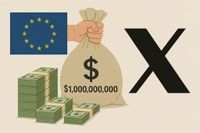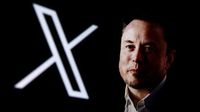The European Union is preparing to impose one of the heaviest sanctions ever applied to a social platform: X, owned by Elon Musk, faces a fine exceeding 1 billion dollars for violations of the Digital Services Act (DSA). This is the new European regulation that imposes strict rules on content moderation, advertising transparency, and the fight against disinformation.
According to the New York Times, the investigation by the European Commission – initiated in 2023 – aims to demonstrate that X did not comply with the legal obligations in managing user-generated content, allowing the uncontrolled spread of disinformation on a large scale, incitement to hatred, and illegal and potentially dangerous content for democracy. A source close to the dossier stated: “The goal is to make X a concrete example, to discourage other platforms from underestimating the responsibilities imposed by the DSA.”
In addition to the economic sanction, Brussels is reportedly preparing a series of requests for changes to the platform’s functionalities and policies, aimed at strengthening the control and moderation systems. In the meantime, a second parallel investigation is also underway, of a broader scope, which could lead to further sanctions. Some EU officials are assessing whether X’s “non-interventionist” approach has turned the social platform into a hub of toxic content.
The Digital Services Act, which came into effect in 2023, is the EU regulation that imposes new responsibilities on large digital platforms. The main areas regulated are timely removal of illegal content, obligation of transparency on algorithms, traceability of advertising advertisers, and verification of potentially false or manipulative content. The DSA applies to all “Very Large Online Platforms” (VLOPs), meaning those with more than 45 million active users in the EU.
The EU initiative comes at a delicate geopolitical moment. Elon Musk is considered close to Donald Trump, who has just announced new tariffs against Europe. According to some sources, the fine could be calibrated to send a strong signal without fueling further tensions with the United States. “We apply our laws fairly and impartially towards all companies operating in our territory,” stated a spokesperson for the European Commission to the New York Times, without directly mentioning X.
In an official note published by X, the platform responded to the rumors with harsh tones: “If the reports are accurate, this is an act of political censorship without precedent and an attack on freedom of speech in Europe. We have done everything to comply with the DSA and will use every legal option to defend our business and our users.”
What will happen now? The European authorities are still determining the exact amount of the fine, which could exceed one billion euros, but the door remains open to an agreement with X, provided that the platform accepts the requested changes. The official decision is expected in the summer of 2025 and could represent a historic turning point in the application of digital regulation in Europe.
The affair between Elon Musk, the X platform, and the European Union exposes one of the central issues of our time: where does freedom of expression end and where does the responsibility of the platforms begin? Whatever the final outcome, this will be a textbook case for the entire global digital ecosystem.
European Union regulators are preparing major penalties against Elon Musk’s social media platform, X, for breaking a landmark law to combat illicit content and disinformation, said four people with knowledge of the plans, a move that is likely to ratchet up tensions with the United States by targeting one of President Trump’s closest advisers.
The penalties are set to include a fine and demands for product changes, said the people, who declined to be identified discussing an ongoing investigation. These are expected to be announced this summer and would be the first issued under a new E.U. law intended to force social media companies to police their services.
European authorities have been weighing how large a fine to issue X as they consider the risks of further antagonizing Mr. Trump amid wider trans-Atlantic disputes over trade, tariffs, and the war in Ukraine. The fine could surpass $1 billion, one person said, as regulators seek to make an example of X to deter other companies from violating the law, the Digital Services Act.
E.U. officials said their investigation into X was progressing independently from tariff negotiations after Mr. Trump announced major new levies this week. The investigation began in 2023, and regulators last year issued a preliminary ruling that X had violated the law.
The European Union and X could still reach a settlement if the company agrees to changes that satisfy regulators’ concerns. X also faces a second E.U. investigation that is broader and that could lead to further penalties. In that investigation, two people said, E.U. officials are building a case that X’s hands-off approach to policing user-generated content has made it a hub of illegal hate speech, disinformation, and other material that is viewed as undercutting democracy across the 27-nation bloc.
“We have always enforced and will continue to enforce our laws fairly and without discrimination toward all companies operating in the E.U., in full compliance with global rules,” a spokesman for the European Commission, the bloc’s executive branch, said in a statement on Thursday, declining to comment specifically on X.
On Friday, the commission said it is not preparing a fine of more than $1 billion. “There is no proposal on a fine on the table,” said Thomas Regnier, a spokesman. X declined to comment.
After publication of this article, the company posted that enforcement actions against it would be “an unprecedented act of political censorship and an attack on free speech.” X said it would do everything it could to defend its business and “protect freedom of speech in Europe.”
Officials in Brussels expect Mr. Musk, who has criticized European policies as a form of censorship, to fight any regulation. In July, after the European Union’s preliminary findings were released, Mr. Musk said he looked forward to contesting any penalty in “a very public battle in court.” That could set up a legal confrontation with wide-ranging ramifications.
If Mr. Musk refuses to comply with E.U. orders to change his service, a standoff may result. The X investigation has been closely watched as the first major attempt to enforce the Digital Services Act, which requires companies to better police their platforms and to provide adequate transparency about how their services work.
The law has become a point of contention in a trans-Atlantic debate about free speech, with Vice President JD Vance in February likening E.U. regulation to digital censorship. After Mr. Trump was elected, European regulators slowed down the X investigation to assess the potential fallout, one person said. More recently, as trade tensions with the United States intensified, the authorities decided to press ahead.
Last year, European regulators concluded that X was violating the law by refusing to provide data to outside researchers, making it difficult to measure how disinformation and other harmful material spread on the service. The authorities also believe X has failed to provide adequate transparency about advertisers, or to verify the authenticity of users who pay to have a “verified” account, making the platform more vulnerable to abuse and foreign interference.
The European Union and X have been in discussions for months over the investigation. After the preliminary judgment against X last year, the company replied with hundreds of points of dispute that regulators have been working through to rebut, two officials said.
E.U. officials said the exact penalty against X would not be decided until closer to a final announcement. Under the Digital Services Act, companies can be fined up to 6 percent of global revenue, though regulators rarely pursue the largest possible penalty. Unlike Google, Meta, Apple, and Amazon, which are publicly traded, X is owned solely by Mr. Musk.
E.U. regulators are considering using a piece of the law that lets them calculate a fine based on revenue that also includes other companies Mr. Musk privately controls, like his rocket maker, SpaceX. That increases the potential penalty to well over $1 billion, one person said.
X is not the only tech company in the European Union’s crosshairs. Regulators are expected to announce penalties against Meta and Apple for violating a 2022 law, the Digital Markets Act, intended to boost competition in tech. Meta is also under investigation for potentially violating the Digital Services Act by inadequately protecting minors. The investigations show that the European Union plans to continue aggressive regulation of American tech giants.
For more than a decade, the bloc has investigated or fined U.S. tech giants including Amazon, Apple, Google, and Meta for anticompetitive business practices, lax data privacy, and weak oversight of user-generated content. European tech regulation may have played a role in the size of the tariffs Mr. Trump announced this week against the European Union.



